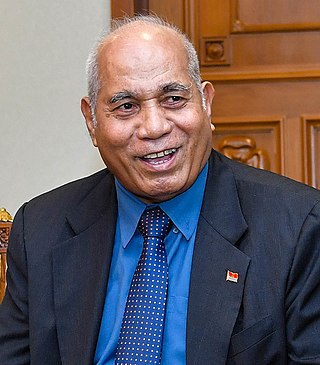
Ieremia Tienang Tabai is an I-Kiribati politician who served as the first president of Kiribati from 1979 to 1991. He previously served in the equivalent role, chief minister, under the colonial government from 1978 to 1979. Tabai returned to the House of Assembly in 1998 and represented Nonouti as of the 2024 election.

Teatao Teannaki was an I-Kiribati political figure who served as the second president of Kiribati from 1991 until 1994.

Teburoro Tito is an I-Kiribati politician and diplomat who served as the third president of Kiribati from 1994 to 2003.

Protect the Maneaba, initially known as the Christian Democratic Party, was a political party in Kiribati.
Education in Kiribati is free and compulsory from age 6 to 14, which includes primary school through grade six, and Junior Secondary School for three additional grade levels. In 1998, the gross primary enrollment rate was 84.4 percent, and net primary enrollment rate was 70.7 percent. School quality and access to education are better in urban areas; schools in small communities on isolated islands are expensive to maintain. Mission schools are slowly being absorbed into the government primary school system.

The Cabinet of Kiribati is the cabinet of the government of the Republic of Kiribati.
Dr. Harry Tong, is an I-Kiribati politician with Chinese heritage. He was born in Tabuaeran, Line Islands and is the second child of Chinese immigrant Tong Ting Hai and Nei Keke Randolph, of Abaiang and Maiana. Harry Tong attended Wanganui Collegiate School in New Zealand, and then went on to complete his medical training at the Fiji School of Medicine.

Parliamentary elections were held in the Gilbert Islands on 1 February 1978, with a second round on 6 February.

Early parliamentary elections were held in Kiribati on 12 January 1983, with a second round on 19 January. All candidates for the 36 seats ran as independents. Voter turnout was 79.9%.

Parliamentary elections were held in Kiribati on 12 March 1987, with a second round on 19 March. All candidates for the 39 seats ran as independents.

The Gilbert Islands held its first national election to choose a chief minister on 17 March 1978. Opposition leader Ieremia Tabai won with 55.6% of the vote, following a voter turnout of 73.5%. The election for chief minister came after the parliamentary election of the same year and the new parliament's unanimous vote to replace the appointed chief minister with one that was popularly elected.

Kiribati held its first presidential election as an independent nation on 4 May 1982. The incumbent president, Ieremia Tabai, who had been elected while the nation was under colonial rule, won re-election with 48.7% of the vote. He placed ahead of his vice-president Teatao Teannaki, opposition leader Naboua Ratieta, and pro-labour member of parliament Etera Teangana. The candidates were chosen by the parliament of Kiribati; an alliance of pro-government and independent members of parliament nominated Tabai and Teannaki, while an alliance of opposition and pro-labour members of parliament nominated Ratieta and Teangana. The election had a turnout of 82.5 percent of registered voters.

Presidential elections were held in Kiribati on 17 February 1983. Ieremia Tabai, the incumbent president, won re-election with 49.61% of the vote. Four candidates were chosen from members of parliament. Besides Tabai, these were: vice-president Teatao Teannaki, who was an ally of Tabai, opposition member Tewareka Tentoa, and newly elected opposition member Harry Tong.

Presidential elections were held in Kiribati on 3 July 1991. The result was a victory for Teatao Teannaki, who received 46% of the vote. Voter turnout was 74%.

Taomati T. Iuta was an I-Kiribati politician. He was Speaker of the House of Assembly of Kiribati for the Ninth Parliament (2011–2015). He was the vice president of Kiribati from 1991 to 1994.

Parliamentary elections were held in Kiribati on 30 December 2015, with a second round of voting for 25 seats on 7 January 2016. The result was a victory for the Pillars of Truth party, which won 26 of the 46 seats.

Taneti Maamau is an I-Kiribati politician who has served as the fifth president of Kiribati since 11 March 2016. Maamau is a member of the Tobwaan Kiribati Party. His policies are targeted at strengthening Kiribati's weak economy and alleviating social issues. His government announced the Kiribati Vision for 20 Years (KV20), which plans to develop the tourism and fishing industries with aid from foreign investors.
Ratimiti Babera Kirata (1938-1991) was an I-Kiribati politician, elected in the House of Representatives in 1967 for the constituency of Onotoa. He was nominated candidate to the 1978 Gilbertese Chief Minister election. He was born in Onotoa where he was continuously elected MP from 1978 to his death, dying less than one month before the general election of May 1991. He was at that moment one of the possible candidates to the succession of Ieremia Tabai as the Beretitenti. He was one of the founders and the first president of the Gilbertese National Party and later of the National Progressive Party (Kiribati). He had been continuously member of the Cabinet of Kiribati from 1979 to 1991.

The Ministry of Foreign Affairs and Immigration (MFAI) is a government ministry of Kiribati. The Minister is the President of Kiribati since its creation.

Roniti Teiwaki is an I-Kiribati politician.














